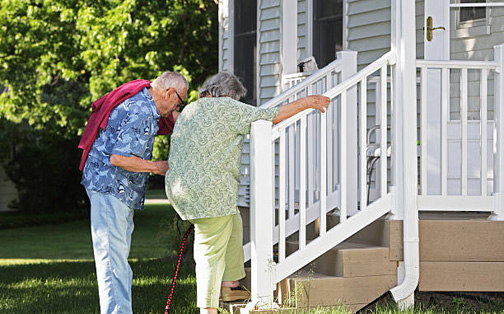Aging in Place – Things to Consider
According to the University of Michigan National Poll on Healthy Aging, 88% of people between ages of 50 and 80 say they wish to stay in their homes for as long as possible, or “age in place.” For many people aging in place provides a haven of comfort and familiarity. However, this is ideally an informed decision that has many considerations such as: safety/adaptability, community, supports and financial resources, to name a few.
Safety/Adaptability – Physical limitations may arise as you age. Is your home able to be adapted to support these limitations? For example, if you have a two-story home is there a bedroom on the ground floor should navigating stairs become difficult? Are you able to arrange the additional accommodations such as accessible showers and toilets, handrails and ramps to support changes in balance and ambulation should you one day need more assistance?
Community – Social connection is vital as we age. Loneliness impacts us emotionally and physically. Do you have family or friends nearby who will visit? Do you belong to clubs or visit a community center that offers activities? Do you have access to public transportation should driving become an issue?
Supports – The need for hands-on help can increase as we age and while some of that support can come from willing family, friends and neighbors you may need to hire help for tasks such as: housekeeping/laundry, shopping, meal prep, home repair/landscaping, medication management, daily activities (bathing, dressing, grooming, etc.). Help from those you know well can play a big role, but relying on others can present problems such as caregiver burnout. It’s important to consider the limitations of your support system before counting on their assistance.
Financial Resources – According to Genworth’s 2021 Cost of Care Study, the median cost of a home health aide was over $5,000/month. If you have a Medicare Advantage (Part C) plan it may include some minor financial coverage of support services. Those with long term care insurance or a sufficient nest egg of savings will be paying out of pocket for services like personal home care, adult day services, meals, and home modifications to name a few.

All of these factors require careful consideration when making decisions about where and how we age. Other options, such as shared housing, are emerging. Retirement communities currently offer coordinated access to activities, services, amenities and social connection that many older adults appreciate. For ease in care as you age there are continuing care retirement communities (CCRCs), bringing together multiple types of housing arrangements including independent, assisted living, and memory care.
USC-VHH Community Resource Center for Aging can help you talk through what your goals are when it comes to aging in place, helping you assess your situation and resources to assist in putting together a plan. Complimentary consultations by phone (818) 949-4033 or email Aging-Resources@med.usc.edu.

Program Manager
USC Verdugo Hills Hospital
Community Resource Center for Aging
